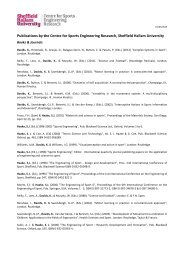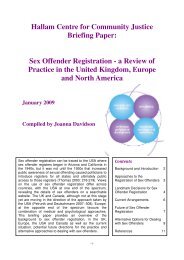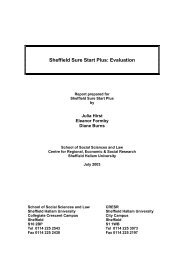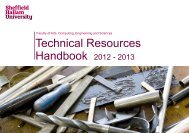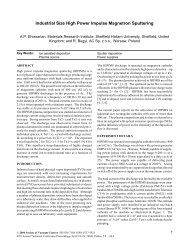The exercise of judicial discretion in rent arrears cases - Sheffield ...
The exercise of judicial discretion in rent arrears cases - Sheffield ...
The exercise of judicial discretion in rent arrears cases - Sheffield ...
You also want an ePaper? Increase the reach of your titles
YUMPU automatically turns print PDFs into web optimized ePapers that Google loves.
Thus it can be seen that the type <strong>of</strong> landlord may have an <strong>in</strong>fluence on the outcome <strong>of</strong> the<br />
case. <strong>The</strong>re may <strong>of</strong> course be other reasons for this, such as local authorities br<strong>in</strong>g<strong>in</strong>g<br />
claims for possession where the level <strong>of</strong> <strong>arrears</strong> is higher than the level at which hous<strong>in</strong>g<br />
associations br<strong>in</strong>g their claims.<br />
‘Tra<strong>in</strong><strong>in</strong>g’ claimants<br />
A relatively consistent feature <strong>of</strong> our <strong>in</strong>terviews with district judges was the way <strong>in</strong> which they<br />
regarded hous<strong>in</strong>g <strong>of</strong>ficers as tra<strong>in</strong>able, and tra<strong>in</strong>ed them over time. This tra<strong>in</strong><strong>in</strong>g was partly<br />
procedural and partly learn<strong>in</strong>g what the district judge would accept. Tra<strong>in</strong><strong>in</strong>g made the list<br />
run smoothly because hous<strong>in</strong>g <strong>of</strong>ficers had ‘got the answers <strong>of</strong>f pat’:<br />
“If you’re deal<strong>in</strong>g, as we do, with fifty or sixty <strong>cases</strong> a day, it’s helpful to have a<br />
reasonably set rout<strong>in</strong>e so we all know where we are, and they know what questions<br />
I’m go<strong>in</strong>g to be ask<strong>in</strong>g and they have their answers straight <strong>of</strong>f pat, and it’s quite a lot<br />
more effective, particularly if I want to ask a quick supplementary, as it were, on a<br />
particular issue, to have them there on the spot.” (DJ J)<br />
“...they’re the same people who come, they know how we operate, they know what<br />
we expect, we expect everyth<strong>in</strong>g to be <strong>in</strong> order, we don’t expect them to ask the<br />
th<strong>in</strong>gs that are unreasonable...” (DJ S)<br />
“I th<strong>in</strong>k that they know my approach by now. And they would probably tailor their<br />
request as soon as they realise that they’re not go<strong>in</strong>g to get anywhere with me. I’m<br />
sure my body language is perfectly clear. <strong>The</strong>n they adjust their position.” (DJ U)<br />
This tra<strong>in</strong><strong>in</strong>g process also means that snapshot methods may not pick up on the relational<br />
nature <strong>of</strong> everyday activity <strong>in</strong> this area. Tra<strong>in</strong><strong>in</strong>g is a limit<strong>in</strong>g process – it limits what is<br />
necessary to ask, and what is possible to request by way <strong>of</strong> an order – <strong>in</strong> which the parties<br />
act silently and know<strong>in</strong>gly. It has a particular impact where untra<strong>in</strong>ed claimants repeatedly<br />
ask for orders which the judge would not ord<strong>in</strong>arily make or where a tra<strong>in</strong>ed claimant asks<br />
for an order that is out <strong>of</strong> the ord<strong>in</strong>ary (see below). This latter po<strong>in</strong>t also suggests that<br />
tra<strong>in</strong><strong>in</strong>g is not a mere one-way process, and that messages are be<strong>in</strong>g sent when an out-<strong>of</strong>the-ord<strong>in</strong>ary<br />
order is requested: “if they really want somebody out, they’ll deal with the case<br />
diffe<strong>rent</strong>ly” (DJ U).<br />
Longevity<br />
<strong>The</strong> length <strong>of</strong> time a particular claimant representative appears before the same judge can<br />
be an important factor <strong>in</strong> this relationship <strong>of</strong> trust. Over time the district judge and<br />
representative become familiar with each other, as well as the parameters with<strong>in</strong> which each<br />
will operate:<br />
“We’re talk<strong>in</strong>g now about landlords who appear frequently before me. And one gets<br />
the feel <strong>of</strong>, has the experience over the weeks, and months and years as to how, I<br />
48



